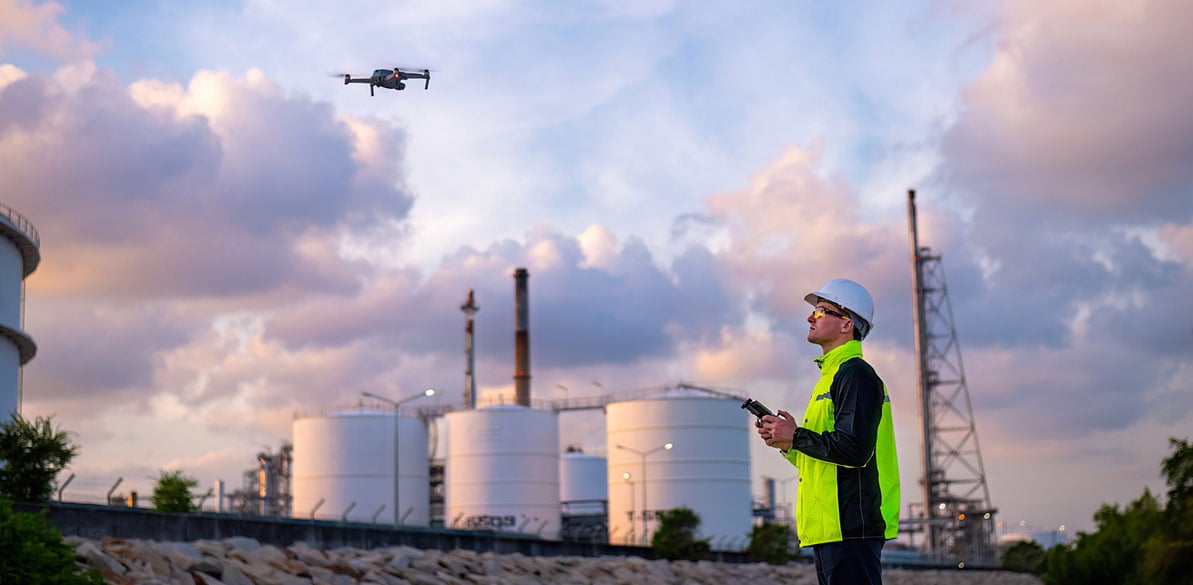Drone Surveillance: Revolutionizing Remote Energy Site Security

- Drone Security
Drone Surveillance is rapidly transforming security for remote energy sites, addressing the unique challenges of these locations.
Energy infrastructure forms the backbone of modern society, providing essential services that sustain our homes, businesses, and industries. Ranging from power plants and distribution systems to storage and charging stations, it ensures a stable, efficient, and reliable energy supply.
To counter evolving threats, drone surveillance has emerged as an innovative virtual security solution with game-changing technology for protecting remote energy sites, offering unparalleled monitoring capabilities and cost-effective security enhancements.
Why Remote Energy Locations Need Enhanced Security
Remote energy facilities, from oil rigs to solar farms, face unique security challenges:
- Vast, often isolated areas to monitor
- High-value assets vulnerable to theft and vandalism
- Limited personnel on-site
- Difficult terrain and harsh environmental conditions
Traditional security methods, such as static cameras and periodic patrols, often fall short in these environments. They may leave blind spots, react slowly to incidents, or struggle with the sheer scale of the area to be monitored.
Enter drone surveillance — a flexible, scalable solution that addresses these challenges head-on — such as the cutting-edge drone security services offered by Titan Protection.
Benefits of Drone Surveillance for Energy Facilities
Drone technology offers several advantages over conventional security approaches:
- 24/7 Monitoring: Automated drone systems can provide round-the-clock aerial surveillance, ensuring constant vigilance.
- Rapid Response: Drones can quickly deploy to investigate alerts, reaching remote areas faster than ground patrols.
- Cost-Effectiveness: By reducing the need for extensive ground personnel, drones can significantly lower security costs.
- Versatility: UAVs can easily access hard-to-reach areas, providing comprehensive coverage of complex facilities.
- Data Collection: Advanced sensors on drones can gather a wealth of information, from visual imagery to thermal data, enhancing situational awareness.
- Deterrence: The visible presence of patrolling drones can discourage potential intruders.
Drone Surveillance Technology
Modern drone security systems leverage technology including:
- Autonomous Flight: Pre-programmed flight paths allow for consistent, reliable patrols without constant human intervention.
- AI-Driven Monitoring: Machine learning algorithms can detect anomalies and potential threats in real-time.
- Geo-Fencing: Virtual boundaries ensure drones operate within designated areas and comply with airspace regulations.
- Emergency Landing Protocols: Features like automatic return-to-home ensure safe operation even in unexpected situations.
Titan Protection's drone solutions incorporate these advanced technologies into their surveillance capabilities for energy sector clients.
Integration with Existing Security Infrastructure
One of the key strengths of drone surveillance is its ability to complement and enhance existing security systems. Titan's drones seamlessly integrate with:
- Traditional CCTV networks
- Perimeter alarm systems
- Access control mechanisms
- Central monitoring stations
This integration creates a multi-layered security approach, where drones can be automatically dispatched to investigate triggered alarms or supplement fixed camera views.
Overcoming Challenges in Remote Site Security
Drone surveillance addresses several challenges unique to remote energy sites:
- Weather Resistance: Advanced drones can operate in various weather conditions, maintaining surveillance even in harsh environments.
- Extended Range: Long-range drones can cover vast areas, ideal for sprawling energy facilities.
- Regulatory Compliance: Titan Protection manages FAA compliance, including securing necessary waivers for Beyond Visual Line of Sight (BVLOS) operations.
- Night Operations: Thermal and infrared cameras allow for effective nighttime monitoring.
Drone Surveillance: Advancing Energy Infrastructure Security
As technology evolves, drone surveillance is set to play an even greater role in securing remote energy sites. We can expect to see improvements such as:
- Improved AI for more accurate threat detection
- Longer flight times through battery advancements
- Swarm drone technology for even broader coverage
- Enhanced data analytics for predictive security measures
These advancements, along with comprehensive and adaptable security solutions like those offered by Titan Protection, represent a paradigm shift in protecting remote energy locations. Drones are not just enhancing protection — they’re redefining the security landscape of energy infrastructure.
Request a Free Consultation
Are you interested in protecting an energy site? Just fill out the form below and click submit and a Titan sales team member will get back to you shortly!
Subscribe To Email Update
Posts by Topic
- Video Monitoring
- Drone Security
- Virtual Guard
- Auto Dealership Security
- Construction Site Security
- News
- Commercial Property Security
- Parking Lot Security
- Press Release
- Blended Security
- Kansas City
- Cannabis Dispensary Security
- Hospital Security
- Campus Security
- Critical Facility Security
- Data Center Security
- Events
- Farm Protection
- Farm Security
- St. Louis Security
